Critical Review Assignment: Mental Health Diagnostic Systems
VerifiedAdded on 2022/10/10
|11
|2621
|19
Essay
AI Summary
This essay presents a critical review of psychiatric diagnostic classification systems, focusing on the argument that these systems lead to suboptimal outcomes for patients. The paper begins by introducing the context of the debate, highlighting the use of systems like the DSM and ICD in mental health care. The author argues in favor of the statement that these systems lead to suboptimal outcomes, emphasizing the potential for over-diagnosis and misdiagnosis, which can result in patients receiving inappropriate treatments. The essay then delves into the lack of comprehensive patient evaluations, the oversimplification of mental illness, and the absence of specific treatment approaches within these diagnostic systems. It critiques the reliance on checklists and clinical observation over scientific medical knowledge, and discusses how these systems can fail to account for the complexity of human behavior, including emotional and socio-cultural factors. The author supports their claims with examples, including a case study of a patient, and references several scholarly sources to support their position. The essay concludes by reiterating the key arguments and emphasizing the need for more nuanced and comprehensive approaches to mental health diagnosis and treatment.
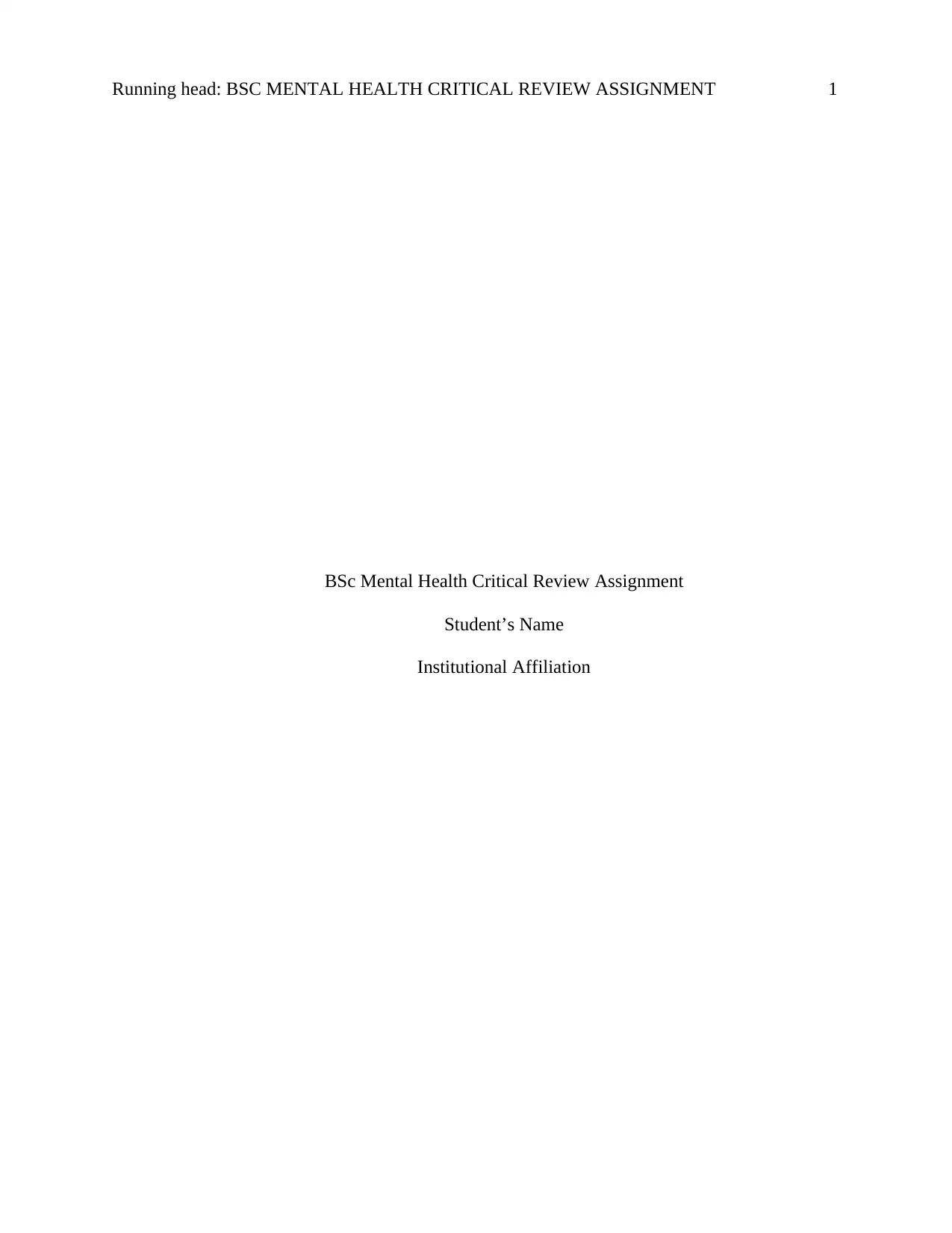
Running head: BSC MENTAL HEALTH CRITICAL REVIEW ASSIGNMENT 1
BSc Mental Health Critical Review Assignment
Student’s Name
Institutional Affiliation
BSc Mental Health Critical Review Assignment
Student’s Name
Institutional Affiliation
Paraphrase This Document
Need a fresh take? Get an instant paraphrase of this document with our AI Paraphraser
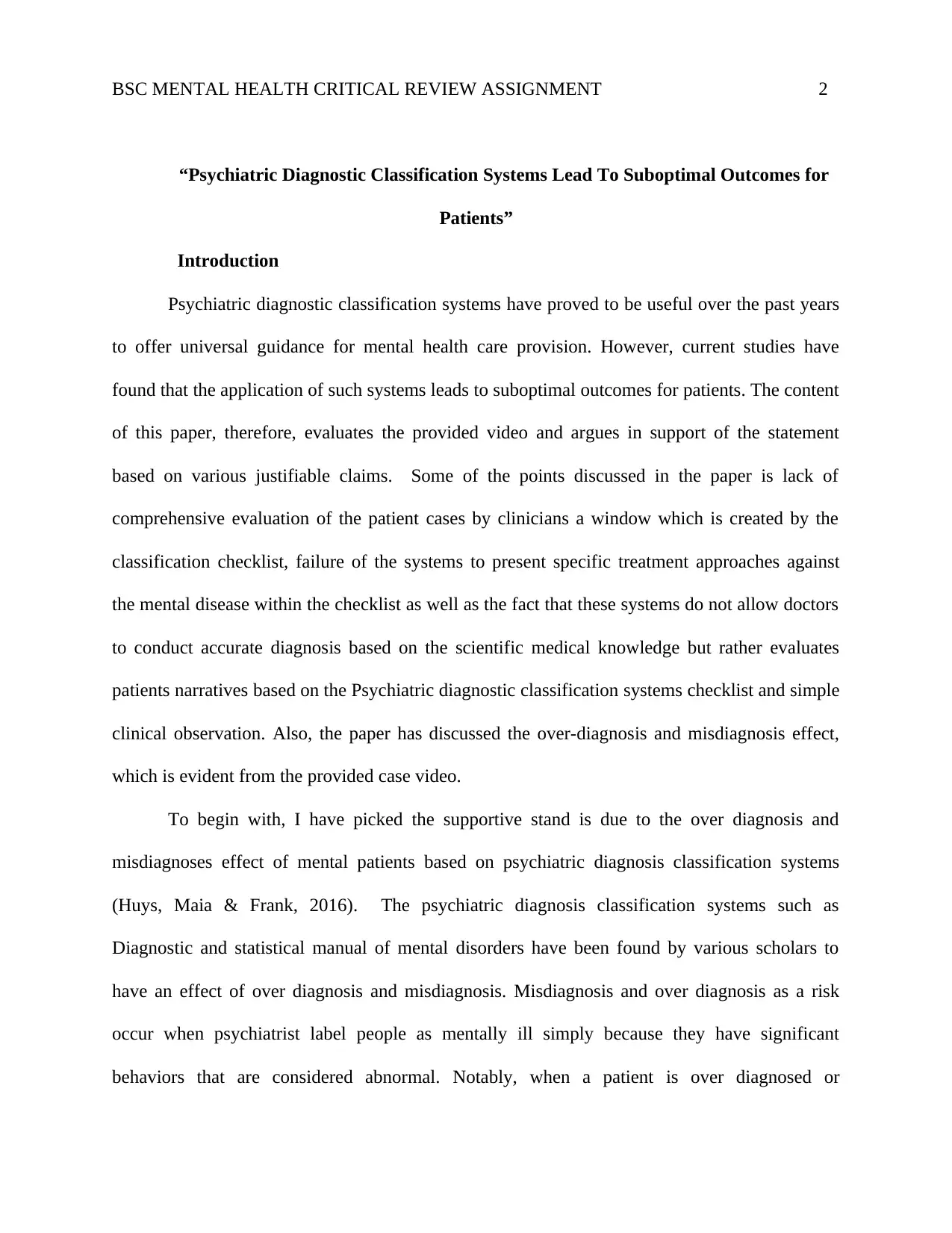
BSC MENTAL HEALTH CRITICAL REVIEW ASSIGNMENT 2
“Psychiatric Diagnostic Classification Systems Lead To Suboptimal Outcomes for
Patients”
Introduction
Psychiatric diagnostic classification systems have proved to be useful over the past years
to offer universal guidance for mental health care provision. However, current studies have
found that the application of such systems leads to suboptimal outcomes for patients. The content
of this paper, therefore, evaluates the provided video and argues in support of the statement
based on various justifiable claims. Some of the points discussed in the paper is lack of
comprehensive evaluation of the patient cases by clinicians a window which is created by the
classification checklist, failure of the systems to present specific treatment approaches against
the mental disease within the checklist as well as the fact that these systems do not allow doctors
to conduct accurate diagnosis based on the scientific medical knowledge but rather evaluates
patients narratives based on the Psychiatric diagnostic classification systems checklist and simple
clinical observation. Also, the paper has discussed the over-diagnosis and misdiagnosis effect,
which is evident from the provided case video.
To begin with, I have picked the supportive stand is due to the over diagnosis and
misdiagnoses effect of mental patients based on psychiatric diagnosis classification systems
(Huys, Maia & Frank, 2016). The psychiatric diagnosis classification systems such as
Diagnostic and statistical manual of mental disorders have been found by various scholars to
have an effect of over diagnosis and misdiagnosis. Misdiagnosis and over diagnosis as a risk
occur when psychiatrist label people as mentally ill simply because they have significant
behaviors that are considered abnormal. Notably, when a patient is over diagnosed or
“Psychiatric Diagnostic Classification Systems Lead To Suboptimal Outcomes for
Patients”
Introduction
Psychiatric diagnostic classification systems have proved to be useful over the past years
to offer universal guidance for mental health care provision. However, current studies have
found that the application of such systems leads to suboptimal outcomes for patients. The content
of this paper, therefore, evaluates the provided video and argues in support of the statement
based on various justifiable claims. Some of the points discussed in the paper is lack of
comprehensive evaluation of the patient cases by clinicians a window which is created by the
classification checklist, failure of the systems to present specific treatment approaches against
the mental disease within the checklist as well as the fact that these systems do not allow doctors
to conduct accurate diagnosis based on the scientific medical knowledge but rather evaluates
patients narratives based on the Psychiatric diagnostic classification systems checklist and simple
clinical observation. Also, the paper has discussed the over-diagnosis and misdiagnosis effect,
which is evident from the provided case video.
To begin with, I have picked the supportive stand is due to the over diagnosis and
misdiagnoses effect of mental patients based on psychiatric diagnosis classification systems
(Huys, Maia & Frank, 2016). The psychiatric diagnosis classification systems such as
Diagnostic and statistical manual of mental disorders have been found by various scholars to
have an effect of over diagnosis and misdiagnosis. Misdiagnosis and over diagnosis as a risk
occur when psychiatrist label people as mentally ill simply because they have significant
behaviors that are considered abnormal. Notably, when a patient is over diagnosed or
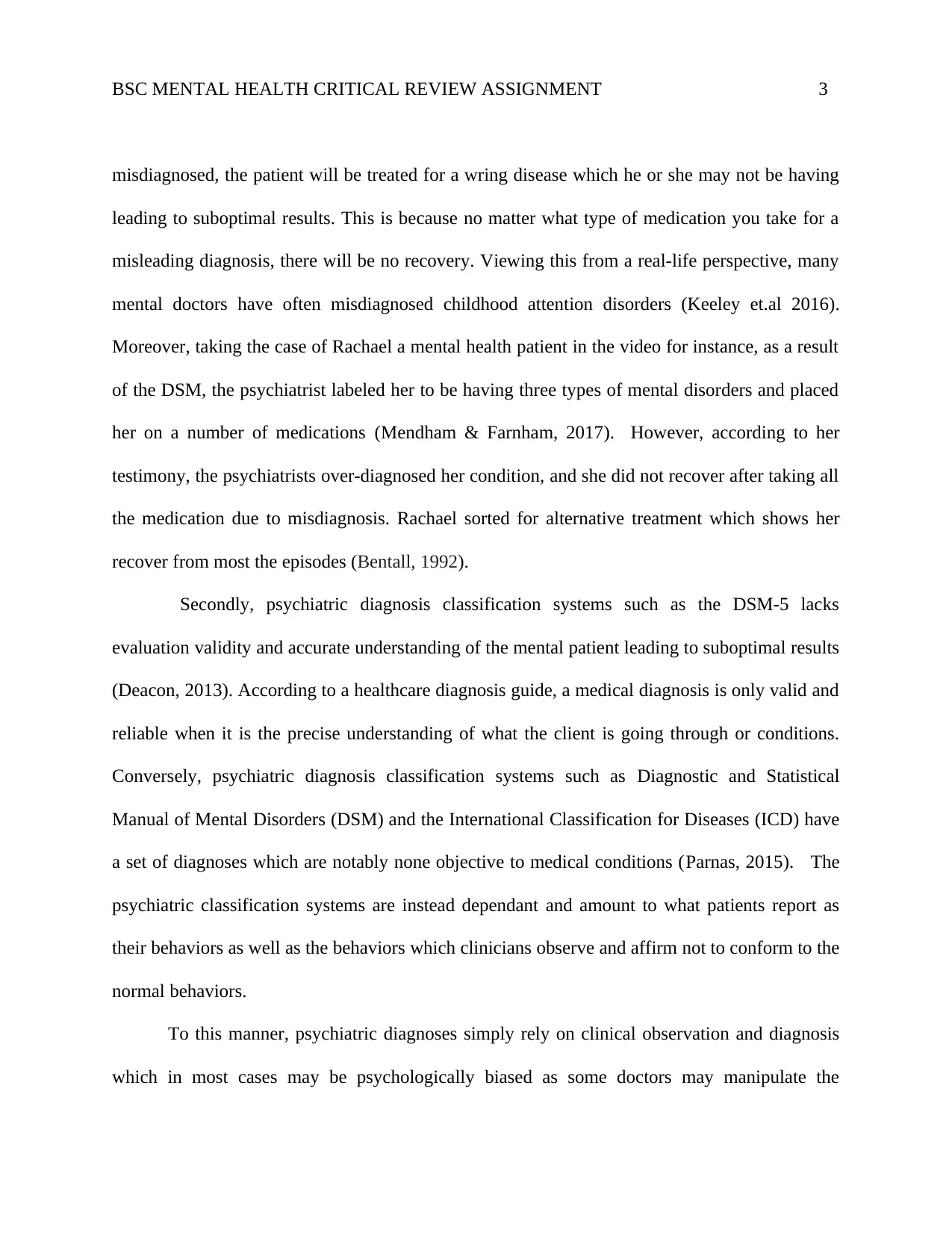
BSC MENTAL HEALTH CRITICAL REVIEW ASSIGNMENT 3
misdiagnosed, the patient will be treated for a wring disease which he or she may not be having
leading to suboptimal results. This is because no matter what type of medication you take for a
misleading diagnosis, there will be no recovery. Viewing this from a real-life perspective, many
mental doctors have often misdiagnosed childhood attention disorders (Keeley et.al 2016).
Moreover, taking the case of Rachael a mental health patient in the video for instance, as a result
of the DSM, the psychiatrist labeled her to be having three types of mental disorders and placed
her on a number of medications (Mendham & Farnham, 2017). However, according to her
testimony, the psychiatrists over-diagnosed her condition, and she did not recover after taking all
the medication due to misdiagnosis. Rachael sorted for alternative treatment which shows her
recover from most the episodes (Bentall, 1992).
Secondly, psychiatric diagnosis classification systems such as the DSM-5 lacks
evaluation validity and accurate understanding of the mental patient leading to suboptimal results
(Deacon, 2013). According to a healthcare diagnosis guide, a medical diagnosis is only valid and
reliable when it is the precise understanding of what the client is going through or conditions.
Conversely, psychiatric diagnosis classification systems such as Diagnostic and Statistical
Manual of Mental Disorders (DSM) and the International Classification for Diseases (ICD) have
a set of diagnoses which are notably none objective to medical conditions (Parnas, 2015). The
psychiatric classification systems are instead dependant and amount to what patients report as
their behaviors as well as the behaviors which clinicians observe and affirm not to conform to the
normal behaviors.
To this manner, psychiatric diagnoses simply rely on clinical observation and diagnosis
which in most cases may be psychologically biased as some doctors may manipulate the
misdiagnosed, the patient will be treated for a wring disease which he or she may not be having
leading to suboptimal results. This is because no matter what type of medication you take for a
misleading diagnosis, there will be no recovery. Viewing this from a real-life perspective, many
mental doctors have often misdiagnosed childhood attention disorders (Keeley et.al 2016).
Moreover, taking the case of Rachael a mental health patient in the video for instance, as a result
of the DSM, the psychiatrist labeled her to be having three types of mental disorders and placed
her on a number of medications (Mendham & Farnham, 2017). However, according to her
testimony, the psychiatrists over-diagnosed her condition, and she did not recover after taking all
the medication due to misdiagnosis. Rachael sorted for alternative treatment which shows her
recover from most the episodes (Bentall, 1992).
Secondly, psychiatric diagnosis classification systems such as the DSM-5 lacks
evaluation validity and accurate understanding of the mental patient leading to suboptimal results
(Deacon, 2013). According to a healthcare diagnosis guide, a medical diagnosis is only valid and
reliable when it is the precise understanding of what the client is going through or conditions.
Conversely, psychiatric diagnosis classification systems such as Diagnostic and Statistical
Manual of Mental Disorders (DSM) and the International Classification for Diseases (ICD) have
a set of diagnoses which are notably none objective to medical conditions (Parnas, 2015). The
psychiatric classification systems are instead dependant and amount to what patients report as
their behaviors as well as the behaviors which clinicians observe and affirm not to conform to the
normal behaviors.
To this manner, psychiatric diagnoses simply rely on clinical observation and diagnosis
which in most cases may be psychologically biased as some doctors may manipulate the
⊘ This is a preview!⊘
Do you want full access?
Subscribe today to unlock all pages.

Trusted by 1+ million students worldwide
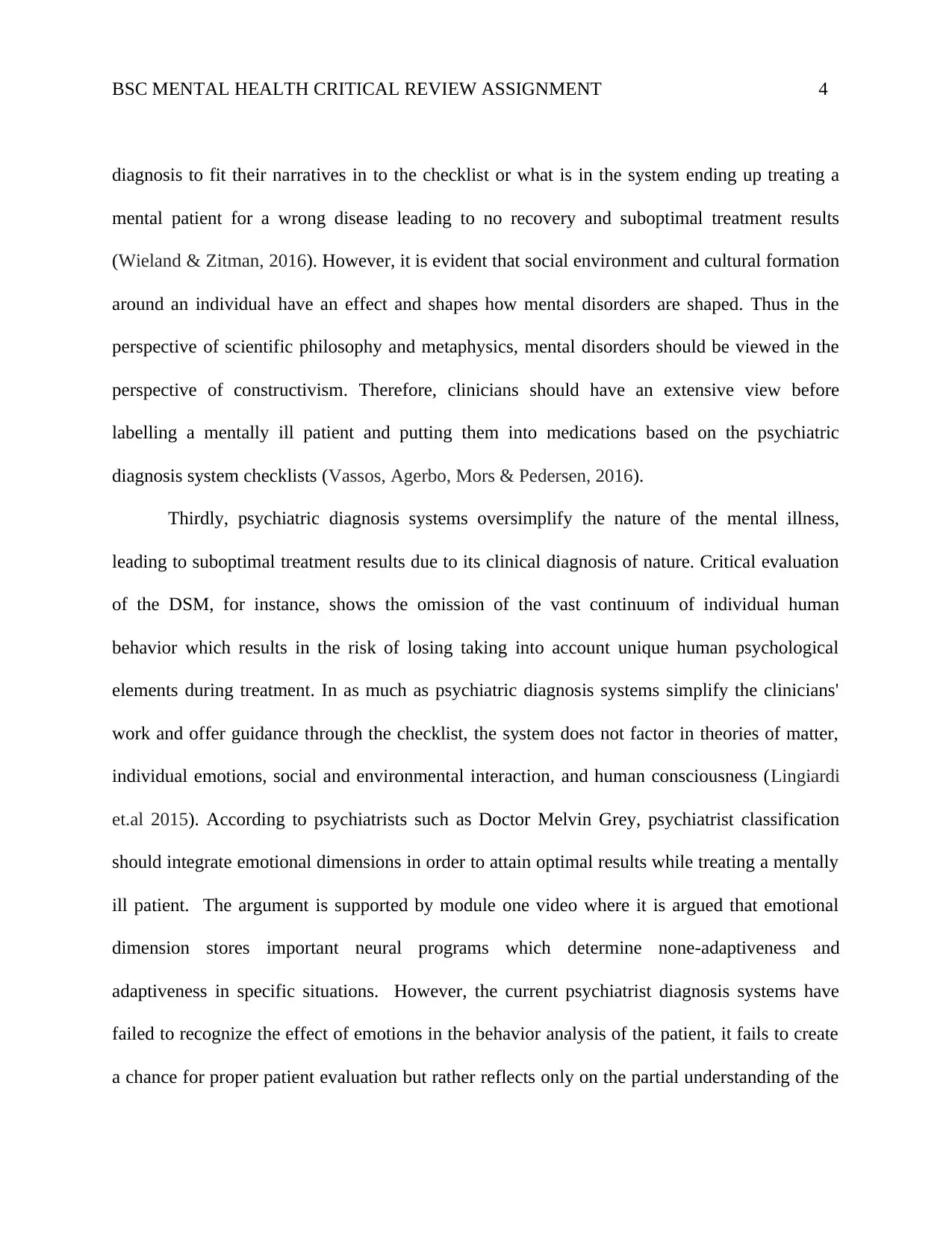
BSC MENTAL HEALTH CRITICAL REVIEW ASSIGNMENT 4
diagnosis to fit their narratives in to the checklist or what is in the system ending up treating a
mental patient for a wrong disease leading to no recovery and suboptimal treatment results
(Wieland & Zitman, 2016). However, it is evident that social environment and cultural formation
around an individual have an effect and shapes how mental disorders are shaped. Thus in the
perspective of scientific philosophy and metaphysics, mental disorders should be viewed in the
perspective of constructivism. Therefore, clinicians should have an extensive view before
labelling a mentally ill patient and putting them into medications based on the psychiatric
diagnosis system checklists (Vassos, Agerbo, Mors & Pedersen, 2016).
Thirdly, psychiatric diagnosis systems oversimplify the nature of the mental illness,
leading to suboptimal treatment results due to its clinical diagnosis of nature. Critical evaluation
of the DSM, for instance, shows the omission of the vast continuum of individual human
behavior which results in the risk of losing taking into account unique human psychological
elements during treatment. In as much as psychiatric diagnosis systems simplify the clinicians'
work and offer guidance through the checklist, the system does not factor in theories of matter,
individual emotions, social and environmental interaction, and human consciousness (Lingiardi
et.al 2015). According to psychiatrists such as Doctor Melvin Grey, psychiatrist classification
should integrate emotional dimensions in order to attain optimal results while treating a mentally
ill patient. The argument is supported by module one video where it is argued that emotional
dimension stores important neural programs which determine none-adaptiveness and
adaptiveness in specific situations. However, the current psychiatrist diagnosis systems have
failed to recognize the effect of emotions in the behavior analysis of the patient, it fails to create
a chance for proper patient evaluation but rather reflects only on the partial understanding of the
diagnosis to fit their narratives in to the checklist or what is in the system ending up treating a
mental patient for a wrong disease leading to no recovery and suboptimal treatment results
(Wieland & Zitman, 2016). However, it is evident that social environment and cultural formation
around an individual have an effect and shapes how mental disorders are shaped. Thus in the
perspective of scientific philosophy and metaphysics, mental disorders should be viewed in the
perspective of constructivism. Therefore, clinicians should have an extensive view before
labelling a mentally ill patient and putting them into medications based on the psychiatric
diagnosis system checklists (Vassos, Agerbo, Mors & Pedersen, 2016).
Thirdly, psychiatric diagnosis systems oversimplify the nature of the mental illness,
leading to suboptimal treatment results due to its clinical diagnosis of nature. Critical evaluation
of the DSM, for instance, shows the omission of the vast continuum of individual human
behavior which results in the risk of losing taking into account unique human psychological
elements during treatment. In as much as psychiatric diagnosis systems simplify the clinicians'
work and offer guidance through the checklist, the system does not factor in theories of matter,
individual emotions, social and environmental interaction, and human consciousness (Lingiardi
et.al 2015). According to psychiatrists such as Doctor Melvin Grey, psychiatrist classification
should integrate emotional dimensions in order to attain optimal results while treating a mentally
ill patient. The argument is supported by module one video where it is argued that emotional
dimension stores important neural programs which determine none-adaptiveness and
adaptiveness in specific situations. However, the current psychiatrist diagnosis systems have
failed to recognize the effect of emotions in the behavior analysis of the patient, it fails to create
a chance for proper patient evaluation but rather reflects only on the partial understanding of the
Paraphrase This Document
Need a fresh take? Get an instant paraphrase of this document with our AI Paraphraser
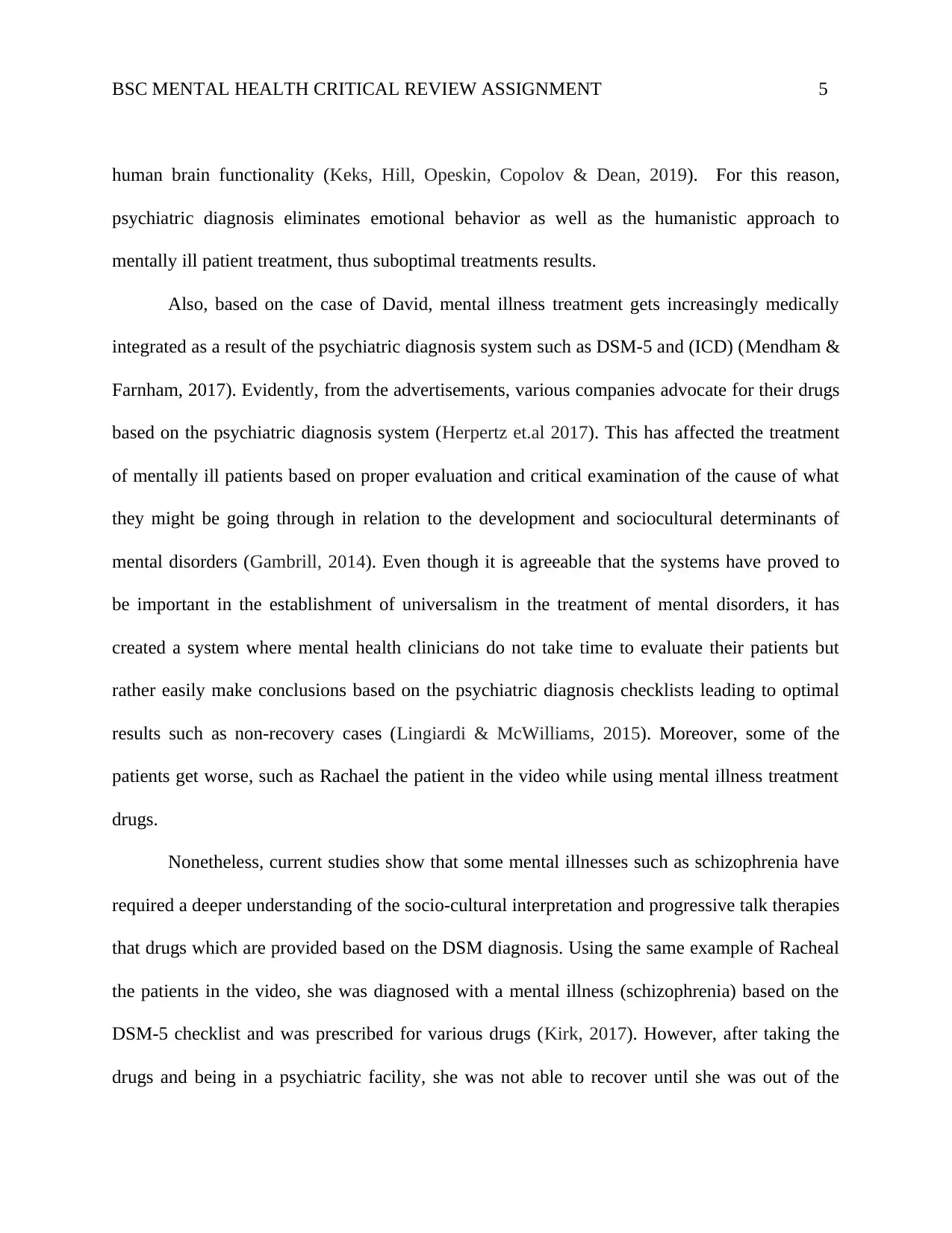
BSC MENTAL HEALTH CRITICAL REVIEW ASSIGNMENT 5
human brain functionality (Keks, Hill, Opeskin, Copolov & Dean, 2019). For this reason,
psychiatric diagnosis eliminates emotional behavior as well as the humanistic approach to
mentally ill patient treatment, thus suboptimal treatments results.
Also, based on the case of David, mental illness treatment gets increasingly medically
integrated as a result of the psychiatric diagnosis system such as DSM-5 and (ICD) (Mendham &
Farnham, 2017). Evidently, from the advertisements, various companies advocate for their drugs
based on the psychiatric diagnosis system (Herpertz et.al 2017). This has affected the treatment
of mentally ill patients based on proper evaluation and critical examination of the cause of what
they might be going through in relation to the development and sociocultural determinants of
mental disorders (Gambrill, 2014). Even though it is agreeable that the systems have proved to
be important in the establishment of universalism in the treatment of mental disorders, it has
created a system where mental health clinicians do not take time to evaluate their patients but
rather easily make conclusions based on the psychiatric diagnosis checklists leading to optimal
results such as non-recovery cases (Lingiardi & McWilliams, 2015). Moreover, some of the
patients get worse, such as Rachael the patient in the video while using mental illness treatment
drugs.
Nonetheless, current studies show that some mental illnesses such as schizophrenia have
required a deeper understanding of the socio-cultural interpretation and progressive talk therapies
that drugs which are provided based on the DSM diagnosis. Using the same example of Racheal
the patients in the video, she was diagnosed with a mental illness (schizophrenia) based on the
DSM-5 checklist and was prescribed for various drugs (Kirk, 2017). However, after taking the
drugs and being in a psychiatric facility, she was not able to recover until she was out of the
human brain functionality (Keks, Hill, Opeskin, Copolov & Dean, 2019). For this reason,
psychiatric diagnosis eliminates emotional behavior as well as the humanistic approach to
mentally ill patient treatment, thus suboptimal treatments results.
Also, based on the case of David, mental illness treatment gets increasingly medically
integrated as a result of the psychiatric diagnosis system such as DSM-5 and (ICD) (Mendham &
Farnham, 2017). Evidently, from the advertisements, various companies advocate for their drugs
based on the psychiatric diagnosis system (Herpertz et.al 2017). This has affected the treatment
of mentally ill patients based on proper evaluation and critical examination of the cause of what
they might be going through in relation to the development and sociocultural determinants of
mental disorders (Gambrill, 2014). Even though it is agreeable that the systems have proved to
be important in the establishment of universalism in the treatment of mental disorders, it has
created a system where mental health clinicians do not take time to evaluate their patients but
rather easily make conclusions based on the psychiatric diagnosis checklists leading to optimal
results such as non-recovery cases (Lingiardi & McWilliams, 2015). Moreover, some of the
patients get worse, such as Rachael the patient in the video while using mental illness treatment
drugs.
Nonetheless, current studies show that some mental illnesses such as schizophrenia have
required a deeper understanding of the socio-cultural interpretation and progressive talk therapies
that drugs which are provided based on the DSM diagnosis. Using the same example of Racheal
the patients in the video, she was diagnosed with a mental illness (schizophrenia) based on the
DSM-5 checklist and was prescribed for various drugs (Kirk, 2017). However, after taking the
drugs and being in a psychiatric facility, she was not able to recover until she was out of the
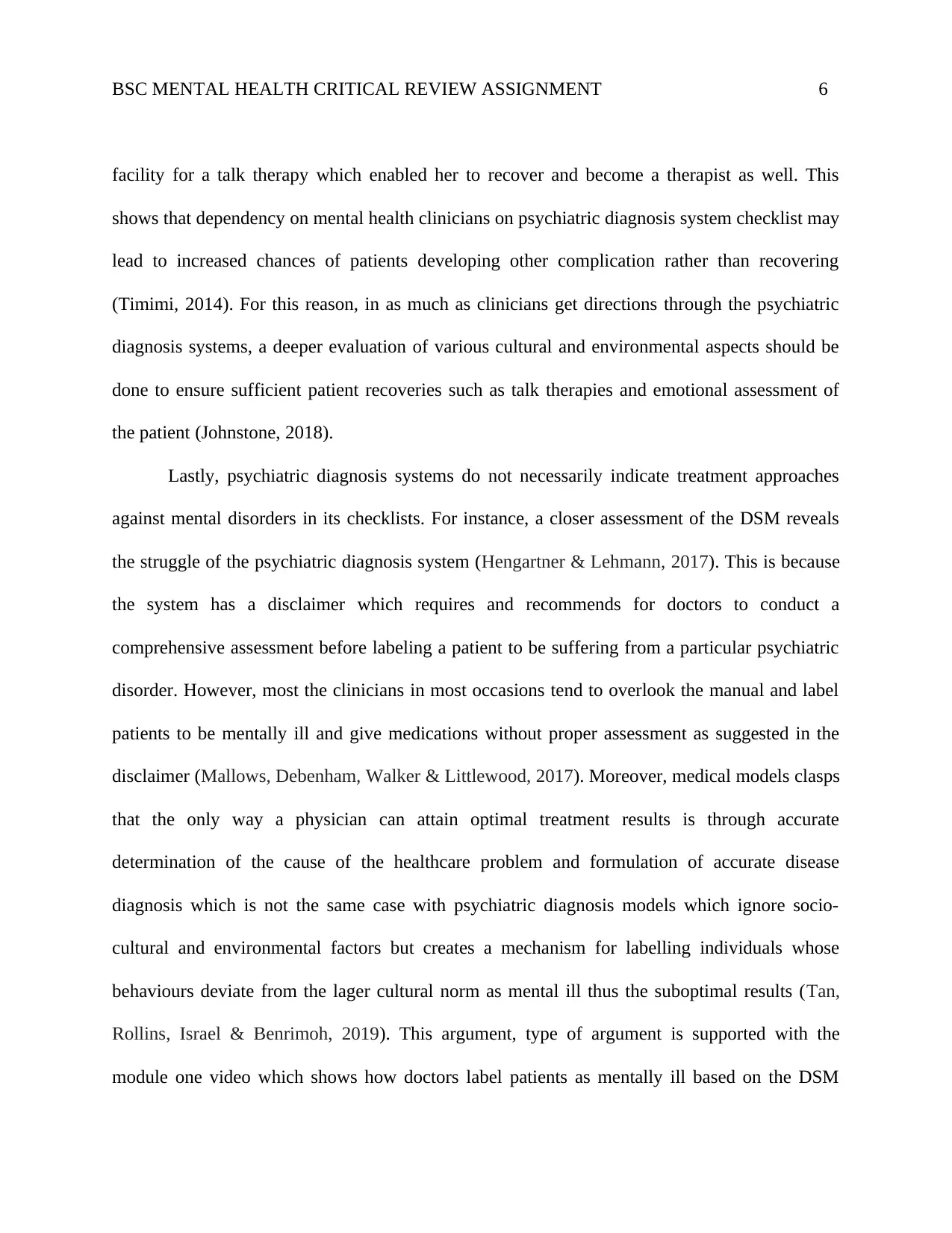
BSC MENTAL HEALTH CRITICAL REVIEW ASSIGNMENT 6
facility for a talk therapy which enabled her to recover and become a therapist as well. This
shows that dependency on mental health clinicians on psychiatric diagnosis system checklist may
lead to increased chances of patients developing other complication rather than recovering
(Timimi, 2014). For this reason, in as much as clinicians get directions through the psychiatric
diagnosis systems, a deeper evaluation of various cultural and environmental aspects should be
done to ensure sufficient patient recoveries such as talk therapies and emotional assessment of
the patient (Johnstone, 2018).
Lastly, psychiatric diagnosis systems do not necessarily indicate treatment approaches
against mental disorders in its checklists. For instance, a closer assessment of the DSM reveals
the struggle of the psychiatric diagnosis system (Hengartner & Lehmann, 2017). This is because
the system has a disclaimer which requires and recommends for doctors to conduct a
comprehensive assessment before labeling a patient to be suffering from a particular psychiatric
disorder. However, most the clinicians in most occasions tend to overlook the manual and label
patients to be mentally ill and give medications without proper assessment as suggested in the
disclaimer (Mallows, Debenham, Walker & Littlewood, 2017). Moreover, medical models clasps
that the only way a physician can attain optimal treatment results is through accurate
determination of the cause of the healthcare problem and formulation of accurate disease
diagnosis which is not the same case with psychiatric diagnosis models which ignore socio-
cultural and environmental factors but creates a mechanism for labelling individuals whose
behaviours deviate from the lager cultural norm as mental ill thus the suboptimal results (Tan,
Rollins, Israel & Benrimoh, 2019). This argument, type of argument is supported with the
module one video which shows how doctors label patients as mentally ill based on the DSM
facility for a talk therapy which enabled her to recover and become a therapist as well. This
shows that dependency on mental health clinicians on psychiatric diagnosis system checklist may
lead to increased chances of patients developing other complication rather than recovering
(Timimi, 2014). For this reason, in as much as clinicians get directions through the psychiatric
diagnosis systems, a deeper evaluation of various cultural and environmental aspects should be
done to ensure sufficient patient recoveries such as talk therapies and emotional assessment of
the patient (Johnstone, 2018).
Lastly, psychiatric diagnosis systems do not necessarily indicate treatment approaches
against mental disorders in its checklists. For instance, a closer assessment of the DSM reveals
the struggle of the psychiatric diagnosis system (Hengartner & Lehmann, 2017). This is because
the system has a disclaimer which requires and recommends for doctors to conduct a
comprehensive assessment before labeling a patient to be suffering from a particular psychiatric
disorder. However, most the clinicians in most occasions tend to overlook the manual and label
patients to be mentally ill and give medications without proper assessment as suggested in the
disclaimer (Mallows, Debenham, Walker & Littlewood, 2017). Moreover, medical models clasps
that the only way a physician can attain optimal treatment results is through accurate
determination of the cause of the healthcare problem and formulation of accurate disease
diagnosis which is not the same case with psychiatric diagnosis models which ignore socio-
cultural and environmental factors but creates a mechanism for labelling individuals whose
behaviours deviate from the lager cultural norm as mental ill thus the suboptimal results (Tan,
Rollins, Israel & Benrimoh, 2019). This argument, type of argument is supported with the
module one video which shows how doctors label patients as mentally ill based on the DSM
⊘ This is a preview!⊘
Do you want full access?
Subscribe today to unlock all pages.

Trusted by 1+ million students worldwide
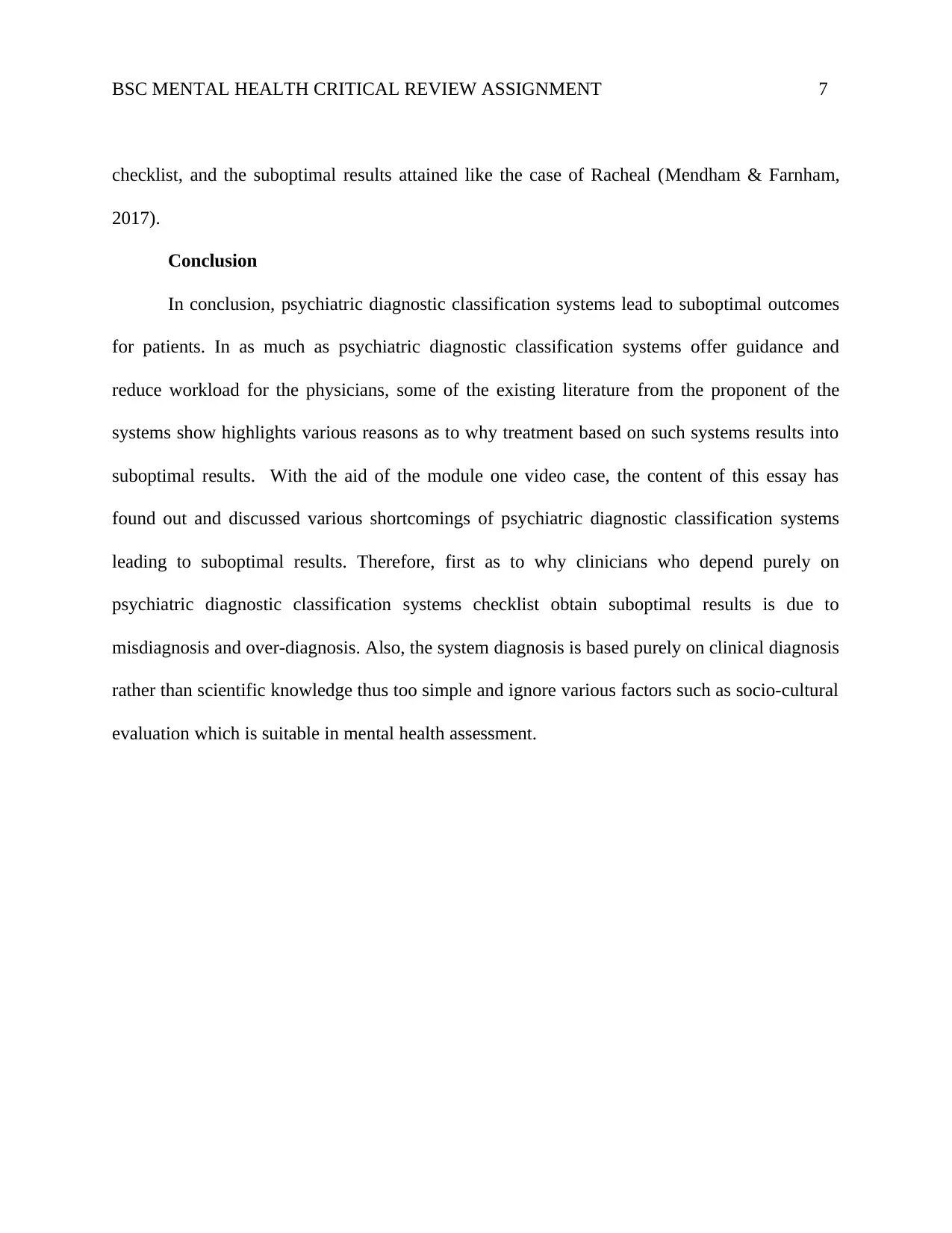
BSC MENTAL HEALTH CRITICAL REVIEW ASSIGNMENT 7
checklist, and the suboptimal results attained like the case of Racheal (Mendham & Farnham,
2017).
Conclusion
In conclusion, psychiatric diagnostic classification systems lead to suboptimal outcomes
for patients. In as much as psychiatric diagnostic classification systems offer guidance and
reduce workload for the physicians, some of the existing literature from the proponent of the
systems show highlights various reasons as to why treatment based on such systems results into
suboptimal results. With the aid of the module one video case, the content of this essay has
found out and discussed various shortcomings of psychiatric diagnostic classification systems
leading to suboptimal results. Therefore, first as to why clinicians who depend purely on
psychiatric diagnostic classification systems checklist obtain suboptimal results is due to
misdiagnosis and over-diagnosis. Also, the system diagnosis is based purely on clinical diagnosis
rather than scientific knowledge thus too simple and ignore various factors such as socio-cultural
evaluation which is suitable in mental health assessment.
checklist, and the suboptimal results attained like the case of Racheal (Mendham & Farnham,
2017).
Conclusion
In conclusion, psychiatric diagnostic classification systems lead to suboptimal outcomes
for patients. In as much as psychiatric diagnostic classification systems offer guidance and
reduce workload for the physicians, some of the existing literature from the proponent of the
systems show highlights various reasons as to why treatment based on such systems results into
suboptimal results. With the aid of the module one video case, the content of this essay has
found out and discussed various shortcomings of psychiatric diagnostic classification systems
leading to suboptimal results. Therefore, first as to why clinicians who depend purely on
psychiatric diagnostic classification systems checklist obtain suboptimal results is due to
misdiagnosis and over-diagnosis. Also, the system diagnosis is based purely on clinical diagnosis
rather than scientific knowledge thus too simple and ignore various factors such as socio-cultural
evaluation which is suitable in mental health assessment.
Paraphrase This Document
Need a fresh take? Get an instant paraphrase of this document with our AI Paraphraser
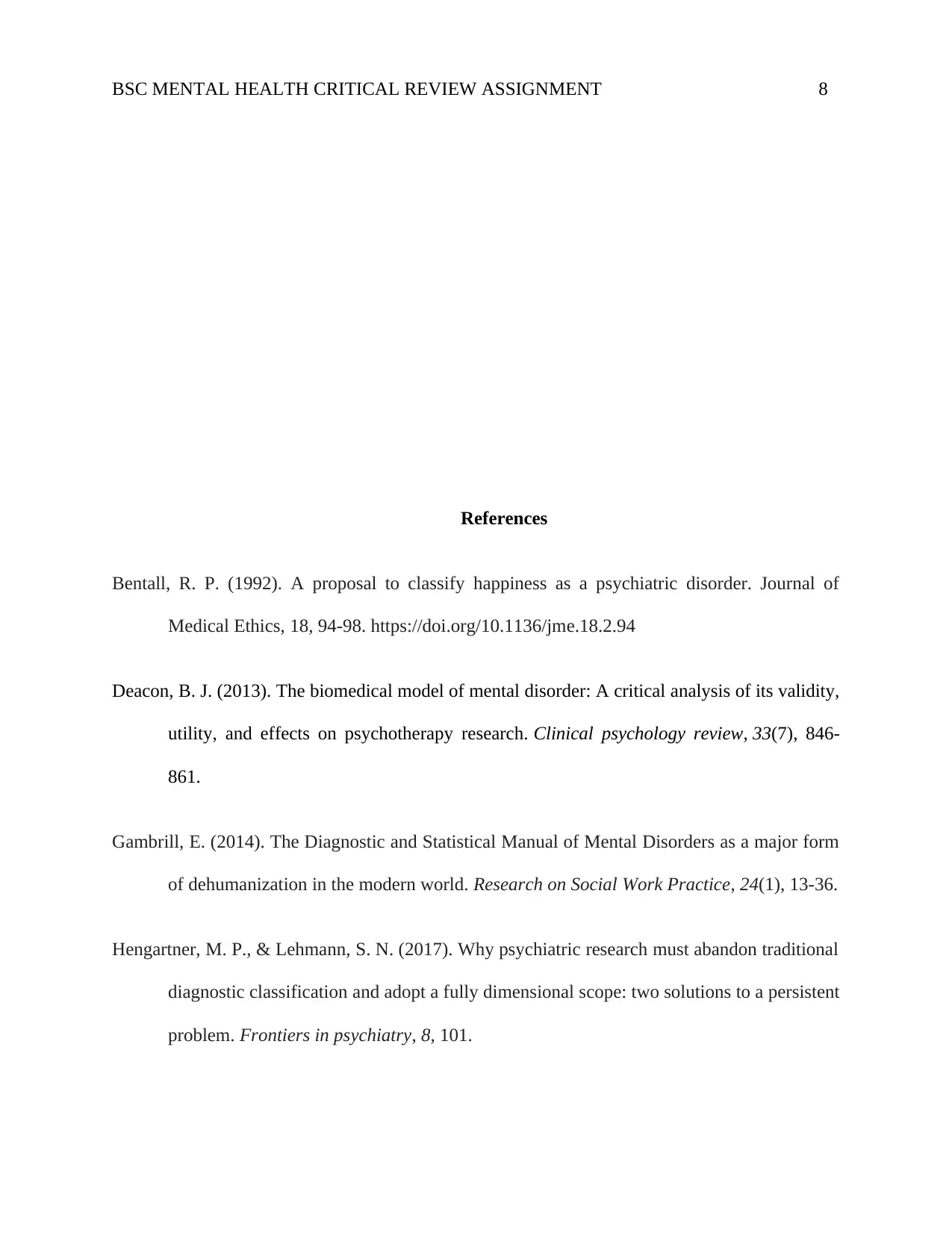
BSC MENTAL HEALTH CRITICAL REVIEW ASSIGNMENT 8
References
Bentall, R. P. (1992). A proposal to classify happiness as a psychiatric disorder. Journal of
Medical Ethics, 18, 94-98. https://doi.org/10.1136/jme.18.2.94
Deacon, B. J. (2013). The biomedical model of mental disorder: A critical analysis of its validity,
utility, and effects on psychotherapy research. Clinical psychology review, 33(7), 846-
861.
Gambrill, E. (2014). The Diagnostic and Statistical Manual of Mental Disorders as a major form
of dehumanization in the modern world. Research on Social Work Practice, 24(1), 13-36.
Hengartner, M. P., & Lehmann, S. N. (2017). Why psychiatric research must abandon traditional
diagnostic classification and adopt a fully dimensional scope: two solutions to a persistent
problem. Frontiers in psychiatry, 8, 101.
References
Bentall, R. P. (1992). A proposal to classify happiness as a psychiatric disorder. Journal of
Medical Ethics, 18, 94-98. https://doi.org/10.1136/jme.18.2.94
Deacon, B. J. (2013). The biomedical model of mental disorder: A critical analysis of its validity,
utility, and effects on psychotherapy research. Clinical psychology review, 33(7), 846-
861.
Gambrill, E. (2014). The Diagnostic and Statistical Manual of Mental Disorders as a major form
of dehumanization in the modern world. Research on Social Work Practice, 24(1), 13-36.
Hengartner, M. P., & Lehmann, S. N. (2017). Why psychiatric research must abandon traditional
diagnostic classification and adopt a fully dimensional scope: two solutions to a persistent
problem. Frontiers in psychiatry, 8, 101.

BSC MENTAL HEALTH CRITICAL REVIEW ASSIGNMENT 9
Herpertz, S. C., Huprich, S. K., Bohus, M., Chanen, A., Goodman, M., Mehlum, L., ... & Sharp,
C. (2017). The challenge of transforming the diagnostic system of personality
disorders. Journal of personality disorders, 31(5), 577-589.
Huys, Q. J., Maia, T. V., & Frank, M. J. (2016). Computational psychiatry as a bridge from
neuroscience to clinical applications. Nature neuroscience, 19(3), 404.
Johnstone, L. (2018). Psychological formulation as an alternative to psychiatric
diagnosis. Journal of Humanistic Psychology, 58(1), 30-46.
Keeley, J. W., Reed, G. M., Roberts, M. C., Evans, S. C., Medina-Mora, M. E., Robles, R., ... &
Andrews, H. F. (2016). Developing a science of clinical utility in diagnostic classification
systems: Field study strategies for ICD-11 mental and behavioral disorders. American
Psychologist, 71(1), 3.
Keks, N. A., Hill, C., Opeskin, K., Copolov, D. L., & Dean, B. (2019). Psychiatric diagnosis
after death: the problems of accurate diagnosis from case history review and relative
interviews. In Using CNS Autopsy Tissue in Psychiatric Research: A Practical Guide (pp.
29-48). CRC Press.
Kirk, S. A. (2017). The selling of DSM: The rhetoric of science in psychiatry. Routledge.
Lingiardi, V., & McWilliams, N. (2015). The psychodynamic diagnostic manual–2nd edition
(PDM-2). World Psychiatry, 14(2), 237.
Herpertz, S. C., Huprich, S. K., Bohus, M., Chanen, A., Goodman, M., Mehlum, L., ... & Sharp,
C. (2017). The challenge of transforming the diagnostic system of personality
disorders. Journal of personality disorders, 31(5), 577-589.
Huys, Q. J., Maia, T. V., & Frank, M. J. (2016). Computational psychiatry as a bridge from
neuroscience to clinical applications. Nature neuroscience, 19(3), 404.
Johnstone, L. (2018). Psychological formulation as an alternative to psychiatric
diagnosis. Journal of Humanistic Psychology, 58(1), 30-46.
Keeley, J. W., Reed, G. M., Roberts, M. C., Evans, S. C., Medina-Mora, M. E., Robles, R., ... &
Andrews, H. F. (2016). Developing a science of clinical utility in diagnostic classification
systems: Field study strategies for ICD-11 mental and behavioral disorders. American
Psychologist, 71(1), 3.
Keks, N. A., Hill, C., Opeskin, K., Copolov, D. L., & Dean, B. (2019). Psychiatric diagnosis
after death: the problems of accurate diagnosis from case history review and relative
interviews. In Using CNS Autopsy Tissue in Psychiatric Research: A Practical Guide (pp.
29-48). CRC Press.
Kirk, S. A. (2017). The selling of DSM: The rhetoric of science in psychiatry. Routledge.
Lingiardi, V., & McWilliams, N. (2015). The psychodynamic diagnostic manual–2nd edition
(PDM-2). World Psychiatry, 14(2), 237.
⊘ This is a preview!⊘
Do you want full access?
Subscribe today to unlock all pages.

Trusted by 1+ million students worldwide
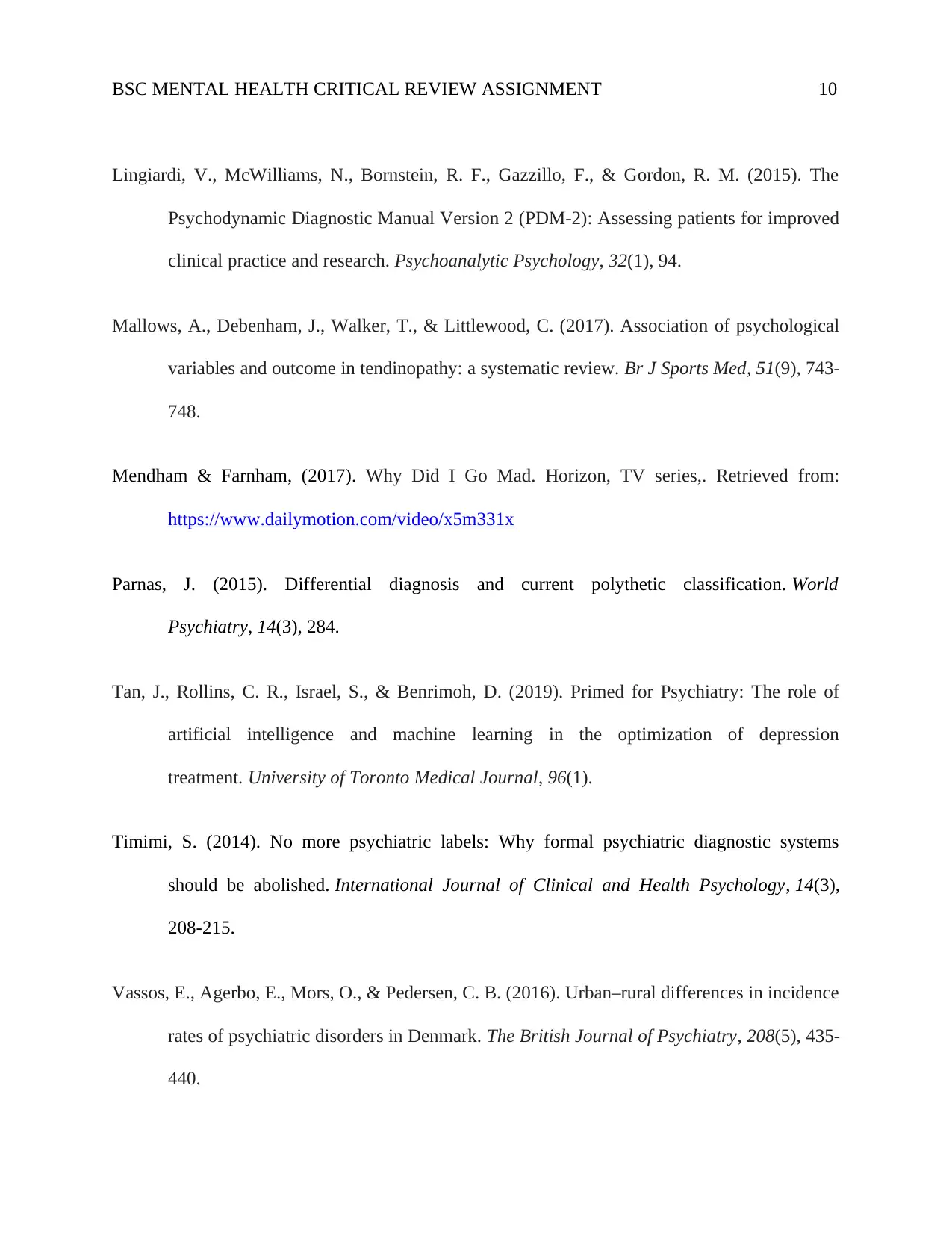
BSC MENTAL HEALTH CRITICAL REVIEW ASSIGNMENT 10
Lingiardi, V., McWilliams, N., Bornstein, R. F., Gazzillo, F., & Gordon, R. M. (2015). The
Psychodynamic Diagnostic Manual Version 2 (PDM-2): Assessing patients for improved
clinical practice and research. Psychoanalytic Psychology, 32(1), 94.
Mallows, A., Debenham, J., Walker, T., & Littlewood, C. (2017). Association of psychological
variables and outcome in tendinopathy: a systematic review. Br J Sports Med, 51(9), 743-
748.
Mendham & Farnham, (2017). Why Did I Go Mad. Horizon, TV series,. Retrieved from:
https://www.dailymotion.com/video/x5m331x
Parnas, J. (2015). Differential diagnosis and current polythetic classification. World
Psychiatry, 14(3), 284.
Tan, J., Rollins, C. R., Israel, S., & Benrimoh, D. (2019). Primed for Psychiatry: The role of
artificial intelligence and machine learning in the optimization of depression
treatment. University of Toronto Medical Journal, 96(1).
Timimi, S. (2014). No more psychiatric labels: Why formal psychiatric diagnostic systems
should be abolished. International Journal of Clinical and Health Psychology, 14(3),
208-215.
Vassos, E., Agerbo, E., Mors, O., & Pedersen, C. B. (2016). Urban–rural differences in incidence
rates of psychiatric disorders in Denmark. The British Journal of Psychiatry, 208(5), 435-
440.
Lingiardi, V., McWilliams, N., Bornstein, R. F., Gazzillo, F., & Gordon, R. M. (2015). The
Psychodynamic Diagnostic Manual Version 2 (PDM-2): Assessing patients for improved
clinical practice and research. Psychoanalytic Psychology, 32(1), 94.
Mallows, A., Debenham, J., Walker, T., & Littlewood, C. (2017). Association of psychological
variables and outcome in tendinopathy: a systematic review. Br J Sports Med, 51(9), 743-
748.
Mendham & Farnham, (2017). Why Did I Go Mad. Horizon, TV series,. Retrieved from:
https://www.dailymotion.com/video/x5m331x
Parnas, J. (2015). Differential diagnosis and current polythetic classification. World
Psychiatry, 14(3), 284.
Tan, J., Rollins, C. R., Israel, S., & Benrimoh, D. (2019). Primed for Psychiatry: The role of
artificial intelligence and machine learning in the optimization of depression
treatment. University of Toronto Medical Journal, 96(1).
Timimi, S. (2014). No more psychiatric labels: Why formal psychiatric diagnostic systems
should be abolished. International Journal of Clinical and Health Psychology, 14(3),
208-215.
Vassos, E., Agerbo, E., Mors, O., & Pedersen, C. B. (2016). Urban–rural differences in incidence
rates of psychiatric disorders in Denmark. The British Journal of Psychiatry, 208(5), 435-
440.
Paraphrase This Document
Need a fresh take? Get an instant paraphrase of this document with our AI Paraphraser
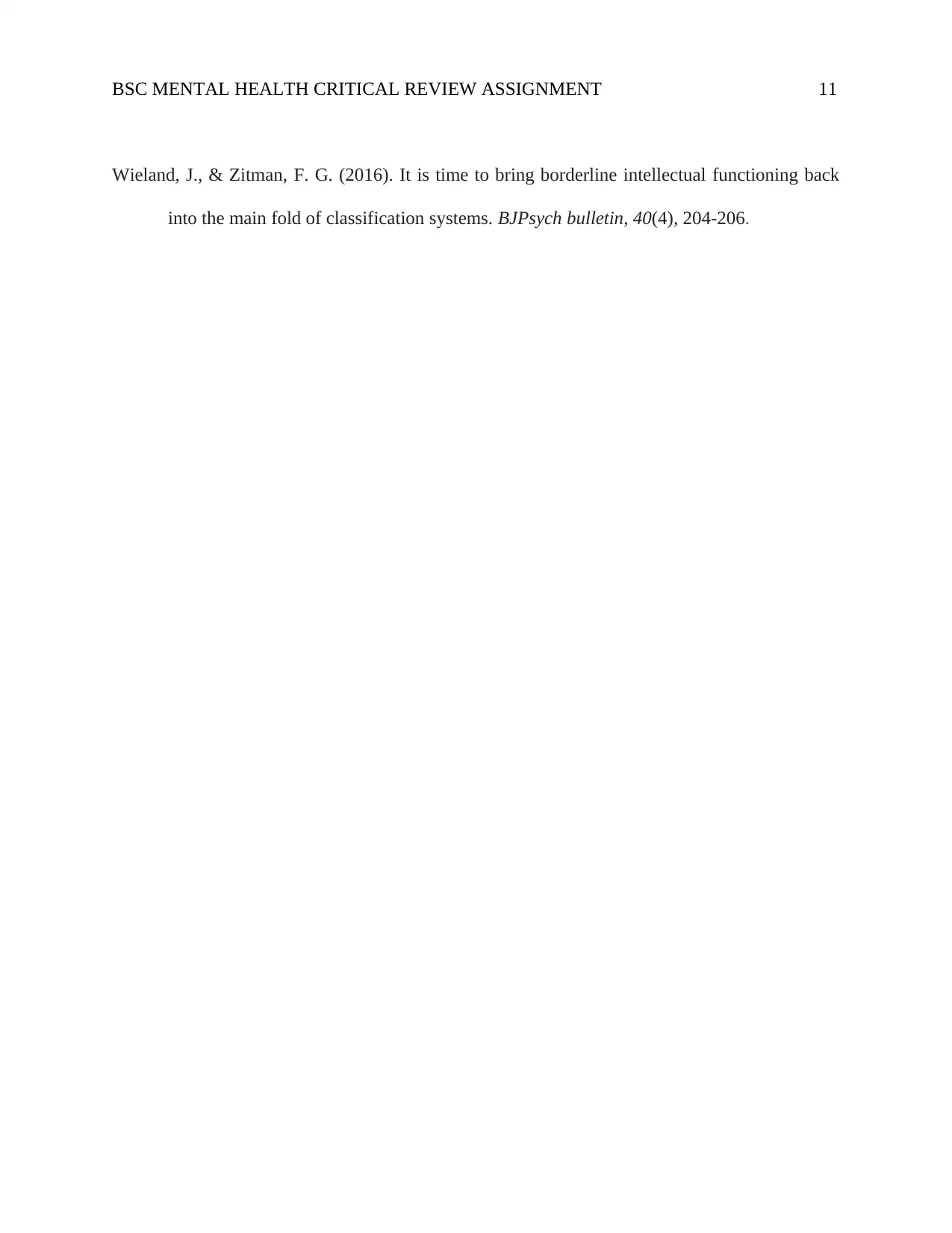
BSC MENTAL HEALTH CRITICAL REVIEW ASSIGNMENT 11
Wieland, J., & Zitman, F. G. (2016). It is time to bring borderline intellectual functioning back
into the main fold of classification systems. BJPsych bulletin, 40(4), 204-206.
Wieland, J., & Zitman, F. G. (2016). It is time to bring borderline intellectual functioning back
into the main fold of classification systems. BJPsych bulletin, 40(4), 204-206.
1 out of 11
Related Documents
Your All-in-One AI-Powered Toolkit for Academic Success.
+13062052269
info@desklib.com
Available 24*7 on WhatsApp / Email
![[object Object]](/_next/static/media/star-bottom.7253800d.svg)
Unlock your academic potential
Copyright © 2020–2026 A2Z Services. All Rights Reserved. Developed and managed by ZUCOL.





